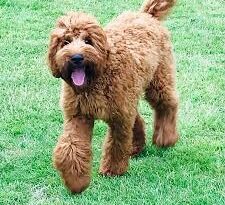Caucasian Shepherd Dogs: Description and Complete Care Guide
The Caucasian Shepherd, also known as the Caucasian Ovcharka, is a powerful and highly protective breed of dog that originated in the Caucasus region of Eurasia. These dogs were originally bred to protect livestock from predators, and they have been used for this purpose for centuries. However, in recent years, the Caucasian Shepherd has become a popular choice for personal protection, due to their impressive size and strength.
The Caucasian Shepherd is a large dog, with males standing up to 30 inches at the shoulder and weighing up to 200 pounds. Females are slightly smaller, standing up to 28 inches at the shoulder and weighing up to 180 pounds. They have thick, dense coats that come in a variety of colors, including white, fawn, brindle, and gray.
Despite their impressive size, the Caucasian Shepherd is known for their loyalty and devotion to their family. They are highly protective of their loved ones and will stop at nothing to keep them safe. However, this same protective instinct can make them wary of strangers, and they require extensive socialization and training to ensure they do not become aggressive towards others.
The Caucasian Shepherd is a highly intelligent breed, and they require a confident and experienced owner who can provide them with the firm but fair leadership they need. They are not a breed for novice owners, and they require a significant amount of time and attention to keep them happy and healthy.
When it comes to training, the Caucasian Shepherd responds best to positive reinforcement techniques, such as praise and treats. Harsh training methods are not recommended, as they can cause the dog to become fearful or aggressive. It is also important to start training and socialization at a young age, so the dog learns to be comfortable around people and other animals.
One thing to keep in mind with the Caucasian Shepherd is their exercise needs. These dogs require a significant amount of exercise and mental stimulation to keep them happy and healthy. They enjoy long walks, hikes, and playtime in a fenced-in yard. However, it is important to keep them on a leash or in a secure area, as they have a strong prey drive and may chase after small animals.
However, the Caucasian Shepherd is a highly impressive and protective breed that requires a confident and experienced owner. They are loyal and devoted to their family, but they require extensive training and socialization to ensure they do not become aggressive towards others. With the right care and attention, the Caucasian Shepherd can make an excellent companion for those who are looking for a highly protective and intelligent dog.
Read Also: Importance of Turmeric and Turmeric Interaction
History and Origin of the Caucasian Shepherd Dogs

The breed was developed over thousands of years by local shepherds and herdsmen who needed a powerful and dependable dog to protect their flocks from predators such as wolves, bears, and jackals. The harsh and rugged terrain of the Caucasus Mountains demanded a dog that was strong, courageous, and resilient, and the Caucasian Shepherd was bred to meet these demands.
The exact origins of the breed are not known, as the history of the Caucasian Shepherd is steeped in myth and legend. Some theories suggest that the breed may have descended from ancient Molossian dogs, which were bred in ancient Greece for war and hunting. Others suggest that the breed may be related to the Tibetan Mastiff or Central Asian Ovcharka, which were brought to the region by traders and travelers.
Regardless of their exact origins, the Caucasian Shepherd has been an integral part of life in the Caucasus region for centuries. They were used primarily as guard dogs for livestock, but they also served as protectors of their human families and their homes. They were highly valued for their bravery, strength, and loyalty, and were often given as gifts to visiting dignitaries or used as dowry for brides.
In the early 20th century, the Caucasian Shepherd was recognized as a distinct breed by the Soviet Union, and breed standards were established. The breed was used by the Soviet Army as a military dog, and they were also used for search and rescue operations.
Today, the Caucasian Shepherd is a popular breed both in its native region and around the world, and it is recognized by many major kennel clubs.
Health Issues and Lifespan of Caucasian Shepherd Dogs

Like all breeds, the Caucasian Shepherd is prone to certain health issues that potential owners should be aware of. One of the most common health issues seen in this breed is hip dysplasia, which is a condition where the hip joint does not develop properly, leading to arthritis and lameness. This can be a genetic issue, so it is important to choose a reputable breeder who has tested their breeding dogs for hip dysplasia.
Another health issue that can affect the Caucasian Shepherd is bloat, which is a life-threatening condition where the stomach fills with gas and twists on itself. This can happen if the dog eats too quickly or exercises too soon after eating. Other health issues that have been reported in the breed include allergies, eye problems, and skin conditions.
With proper care and attention, the Caucasian Shepherd can live a long and healthy life. The average lifespan for the breed is around 10-12 years, but some dogs have been known to live longer.
To ensure that your Caucasian Shepherd stays healthy, it is important to provide them with a nutritious diet, regular exercise, and routine veterinary care.
Regular check-ups with a veterinarian can help to catch any potential health issues early on, which can improve the prognosis for treatment and overall quality of life.
As with any breed, it is important to do your research and choose a reputable breeder who screens their breeding dogs for health issues. This can help to minimize the risk of health issues in your new pet.
Additionally, it is important to provide your Caucasian Shepherd with plenty of socialization and training from a young age, as this can help to prevent behavioral issues that can be associated with stress and anxiety.
With the right care and attention, the Caucasian Shepherd can make a wonderful and loyal companion for many years to come.
Caucasian Shepherd Dog Breed Complete Grooming and Care Guide

Brushing: The Caucasian Shepherd has a thick and dense coat that requires regular brushing to prevent matting and tangling. You should brush your dog’s coat at least once a week with a slicker brush or a grooming rake. This will help to remove loose hair and dirt, and distribute the natural oils throughout the coat.
Bathing: The Caucasian Shepherd does not require frequent bathing, as this can strip the coat of its natural oils and cause dryness and irritation. However, if your dog gets particularly dirty or smelly, you can bathe them with a gentle dog shampoo. Be sure to rinse thoroughly and dry them off completely to prevent matting and skin issues.
Nail trimming: The Caucasian Shepherd has strong and sturdy nails that grow quickly and require regular trimming. You should trim your dog’s nails every 2-3 weeks, or as needed to keep them at a comfortable length. Use a pair of sharp dog nail clippers and be careful not to cut the quick, which is the sensitive part of the nail that contains blood vessels and nerves.
Dental care: The Caucasian Shepherd is prone to dental issues such as tartar buildup and gum disease, so it is important to provide regular dental care. You should brush your dog’s teeth at least 2-3 times per week with a dog-specific toothbrush and toothpaste. You can also provide dental chews or toys to help keep their teeth clean and healthy.
Exercise: The Caucasian Shepherd is a high-energy breed that requires plenty of exercise and mental stimulation to stay happy and healthy. You should provide your dog with daily walks, runs, or play sessions in a securely fenced area. Be sure to supervise them during outdoor play to prevent injury or escape.
Training and socialization: The Caucasian Shepherd is a loyal and protective breed that requires proper socialization and training to prevent aggression and fearfulness. You should provide your dog with plenty of positive social experiences with other dogs, people, and animals from a young age. Enrolling them in obedience training or working with a professional dog trainer can also help to develop their social skills and obedience.
Veterinary care: The Caucasian Shepherd is prone to certain health issues, so it is important to provide regular veterinary care. You should schedule annual check-ups with a veterinarian, and be sure to keep up-to-date on vaccinations, heartworm prevention, and flea and tick control.
By following these tips and providing regular grooming and care, you can help to keep your Caucasian Shepherd healthy, happy, and looking their best.
Read Also: Health Benefits of Different Fruits and Vegetables
Caucasian Shepherd Puppies

Caucasian Shepherd puppies are adorable and fluffy, but they grow into large and powerful dogs that require a lot of attention and training. If you are considering getting a Caucasian Shepherd puppy, here are some things to keep in mind:
Choose a reputable breeder: It is important to choose a breeder who is reputable and responsible. A good breeder will provide you with information about the breed, answer any questions you may have, and allow you to meet the puppy’s parents. They should also provide you with health certificates and other documentation to prove that the puppy is healthy and has been properly vaccinated.
Socialization: Socialization is crucial for all puppies, but it is particularly important for the Caucasian Shepherd, which can be territorial and protective. It is important to expose your puppy to a variety of people, animals, and environments from a young age to prevent aggression and fearfulness.
Training: Training is also important for the Caucasian Shepherd, which can be stubborn and difficult to train. You should start training your puppy as soon as possible, using positive reinforcement techniques. Consistency and patience are key when training a Caucasian Shepherd.
Exercise: The Caucasian Shepherd is a high-energy breed that requires plenty of exercise and mental stimulation. You should provide your puppy with regular opportunities to play and explore, as well as daily walks or runs.
Health care: The Caucasian Shepherd is prone to certain health issues, such as hip dysplasia and bloat. You should schedule regular check-ups with a veterinarian, and be sure to keep up-to-date on vaccinations, heartworm prevention, and flea and tick control.
Puppy-proofing: As with any puppy, it is important to puppy-proof your home to prevent accidents and injuries. This includes removing any dangerous or chewable objects from your puppy’s reach, and ensuring that your home is securely fenced.
In summary, if you are considering getting a Caucasian Shepherd puppy, it is important to do your research, choose a reputable breeder, and provide your puppy with plenty of socialization, training, exercise, and health care. With the right care and attention, your Caucasian Shepherd puppy can grow up to be a loyal and loving companion.
Read Also: Roles Of Environmental Management Services









